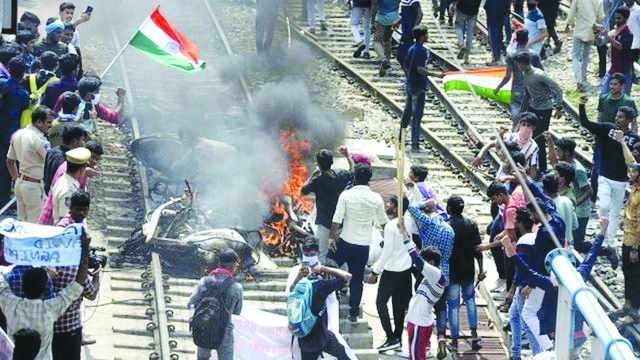Goa is abuzz with excitement as vintage bike and car owners, users, collectors and fans are decking […]

REGULAR SOLDIERS RESENT AGNIVEER SCHEME!
In the News, June 25-July 1 2022 June 24, 2022There was a large scale protest against the Agniveer schemes particularly in Bihar and during the Bharat Bandh on Monday, June 2, and over 300 trains had to be cancelled because of train vandalism.
There are many young men particularly in the Northern state of Bihar who have been training hard to join the regular army. A job in the army is not only a matter of prestige for those in the village but also ensures a steady job for 20 years, lifelong pension and medical care for the soldiers and their family. Regular soldiers are also entitled to housing, free rations and subsidised consumer goods, including scooters and cars from the central defence stores. The entry of Agniveer soldiers may deprive them of their hopes of regular jobs in the army. Some angry villagers in Bihar dug up a sprinting track on which they were practicing fitness tests for regular army recruits.
By Pallav
The Indian government, in consultation with the heads of the three armed forces, unveiled the Agnipath scheme for the recruitment of youngsters in the armed forces on Tuesday (June 14). The new recruits under the initiative will be referred to as ‘Agniveer’ from now on. Both men and women would be eligible to join for a four-year term, including training. Agniveers would be given precedence for jobs in PSUs and state governments once their service is completed.
Hundreds of armed forces ‘aspirants’ rushed to the streets soon after, damaging public property under the guise of ‘peaceful protests’ and demonstrations. While protesting the government initiative, they vandalised public property, burned trains, and brought life to a halt in several Indian states.
To assuage critics’ concerns and offer a comprehensive picture of the scheme, OpIndia spoke with several armed forces veterans to understand the nitty-gritty of it. Here is an excerpt of the remarks given by the veterans of the armed forces.
Lieutenant General Raj Shukla, PVSM, YSM, SM, ADC (Retd.)
I am supportive of the Agnipath scheme as I find this scheme a part of a major National Security makeover. That is why it has to be seen from that perspective. Numerous measures are being taken in procurement, innovation, OFB reforms, DRDO all that stuff. The Agnipath scheme is a comprehensive reform which has 3 modules – Recruitment, Training, and re-enrollment. This is not just about the armed forces but it is a comprehensive scheme.
In recruitment, there is a major change in the metrics. The present recruitment system has gone obsolete as it is 70 years old where the emphasis is only on physical and medical. It is a modified and greatly improved system. The Agnipath scheme is linked further to ITIs and Skill India so that we get better recruits. And when we get better recruits, and as per the retention policy, we will retain the best of the best. All the candidates will go through focused and Scientific training modules in accord with the global standards.
Now, the worry is for the people who will go out after the service period. Since several state governments and central authorities have announced that they will give priority to the Agniveers in various other services, even that concern stands allayed. Also, as this scheme gains momentum over some time, there would be no need left to worry about jobs and pensions. The products will be so superior that companies like Larsen & Toubro will take them firsthand.
This is a capacity-building scheme which adds value to the individual. All soldierly attributes are not martial in nature. Things like motivation, discipline and focused execution have nothing to do with combat but they are very important skills that we need as a society.
But, since this is just a concept, the devil lies in the detail and implementation. So, there will be some apprehensions as there is change and those need to be addressed. There is one apprehension that the political class has dumped it on us, but it is not true. For two and a half years consultations have been on. It is a well-thought change and it must be taken to accomplishment.
Coming to the point of pension, gone are the days when such things were expected by people. It was because opportunities were limited to defence, railways, education, but now things have completely changed as there are a lot of new domains open for the people. The pension was for those who were dependent, now the scenario is of gaining independence. We have to understand that this is a win-win situation for both, the recruit and the recruiter.
Brigadier DS Tripathi (Retd.)
The government’s Agnipath scheme is a significant step forward in the modernization of the troops. However, there appears to be some misunderstanding about the scheme’s specifics, which must be rectified. The strategy was put in place after much debate and discussion from people both inside and outside the system. The concept is not flawless or without problems, but it must be acknowledged that if the top military generals and chiefs of all three forces have opted to execute it, there must be an element of quality associated with it.
I am not disputing that there may be some faults in the Agnipath scheme, but we will only learn about them if it is implemented. And, because 25% of all recruits will be retained, we will have a great batch of highly skilled troops.For the rest 75 percent people, the opportunities are plentiful. Several state administrations have come forward to support that 75%. I also believe that the government should devise specific programmes to grant waivers to these persons in the Group B and Group C services. Because India is rapidly growing, these Agniveers should be deployed in a variety of places, including villages, to provide remarkable results.
Complaints are not to end anyway. One of the prominent complaints raised by the aspirants is that they have lost two years and there was no recruitment in the forces. The government addressed the concern very well by granting relief of 2 years in the first batch. Also, even after the forces find that they need more troops, I believe that routine recruitment will be done to induct more personnel.
The major challenge of the time is to clarify the doubts of the aspirants. As I find it, the best way to convey the demands will be to approach ex-servicemen and the veterans as the forces are in constant connection with their men. This is a wrong message being disseminated in the world if we look at the mishappenings across the country. Even armed forces never entertain such kind of behaviour. This must be stopped at the earliest.
We need to understand that Agniveers are not just military assets, they are social assets. They will be better than all others in every aspect and they will contribute more than an average individual in each and every sector, whether it be public or private.
Brigadier Bhuwnesh Chaudhary (Retd.)
The Agnipath scheme is a great and wonderful scheme brought forward by the government that will transform the entire orientation of the defence apparatus at first, followed by social reform. The youth would join the army at an early age and receive life-long training that they would not receive even if they spent lakhs of rupees. Here, they will get trained and then be paid for it, and after 4 years, they will have a handsome amount in their hands plus several other opportunities. Everyone is announcing that they will give preference to the Agniveers. This is going to be a revolutionary scheme.
One other point has to be understood that we will have enough reserve with us. It is not just an employment scheme, it involves management of defence of the country. The people who are protesting violently and burning trains have been badly misguided. Whatever is happening is very unfortunate. They must understand that our country is passing through difficult times post coronavirus infection. They can play a big role and they should not indulge in activities like this.
We have to understand that the youth is not much experienced. So they cannot decide right and wrong. They are being misguided by some elements continuously which is very bad. I am saying that let the scheme be implemented first and then find the reasons to criticize. This is like one has become a fortuneteller who knows that this is going to fail. People are unnecessarily professing dooms. I’ve been a short service commission officer and I am also a doctor. I got commissioned just for five years and got my permanent commission just after three and a half years. Till then even I was not sure but through determination I got it. Some of my colleagues missed it but they are doing well.
Our youth must be ready to face the modern day challenges and that can be well taught in the forces. I have been in service for 33 years and no one can tell better about this scheme. I find this scheme exceptionally wonderful.
Colonel S Dinny (Retd.)
This is a transformational decision the government of India has taken as far as the human resource management of the Indian Armed Forces are concerned. There has been a radical change in the way warfare has evolved over time since the Indian independence. Technology has changed but what has not changed for so many years is the human resource management of the forces and especially of the Indian Army. So, this present scheme will try to overcome many of the present issues in the forces as far as the management of the forces is concerned.
One of the most important issues to be addressed is the high age profile of the armed forces. The present average age is 32 which is on the higher side when compared to the professional forces across the globe. So, there is a need to bring down the age to a reasonable point of around 20 to 25 and this particular scheme will help to achieve that in the next 5 to 7 years.
The second very important point is that through this scheme, we will be able to overcome the colonial baggage of the British way of recruitment system in which a particular class or composition was recruited. There is a need to have an ‘All India All Class’ composition across the armed forces.
The third point I want to make is that since only 25% of the people will be retained for continuation in the services and that through a stringent selection process, only the best of the best will be chosen. So, in the future, the quality will definitely go up. One more point I would like to make is that about 58 per cent of the defence budget is spent only on salaries and pensions. So there is a need to get this bill down so that we can have more amount for capital expenditure thereby helping in the modernisation of the armed forces. This scheme would help us achieve that goal. And though many people are saying that the reduction in the pension bill is the only reason behind this, I find this conclusion to be untrue. It is to be accepted that it is just one offset of this scheme.
Coming to international standards, such schemes have been implemented in several countries across the globe. Many of the countries have already tested and proved the worth of such a scheme in which a civilian comes, gets trained for a particular period of time, then leaves and finds another job based on the experience he has gained from his service. This is another reason why I am very much optimistic about the success of the Agnipath scheme. I also do understand that the challenges India faces are different from other nations but even keeping in mind those challenges, I don’t see a reason why the Agnipath scheme should be called a disaster.
The present t agitation which has gone violent has to be understood in a different way. First of all, there has been no recruitment in the last two years owing to the coronavirus pandemic so that is one frustration that is coming out. So, when this scheme came, many thought that their chances have gone and they won’t be able to make it to their dream of joining the armed forces. This is the reason which led to an initial spontaneous protest. However, after a while, like all other protests in India, it got hijacked by some anti-social elements pushing it to a different level. I can say that we could have communicated that in a better manner.
All the veterans were interviewed by OpIndia virtually.















